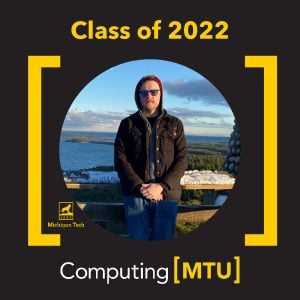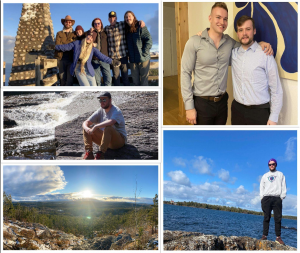
It was a visit to campus that cemented Mitch Eckstrand’s choice to attend Michigan Tech instead of Michigan State University. Eckstrand graduated this spring with a B.S. in Computer Engineering.
“After visiting Houghton for the first time, I really fell in love with the area and the change of pace it could provide,” he explains. “I had grown up in a large city, so moving to a town as small as Houghton seemed like a great way to gain some new perspectives on life. Michigan Tech also has a great academic culture, and for the degree that I am pursuing, it is one of the best in the state, as well as in the country.”
When he first arrived, ten hours from home and everyone he had ever known, it was definitely difficult. At times, he was tempted to just pack it up and head back home.
“However, I am the type of person that will see something out until the end, so I persevered and put my head down,” he says. “I worked hard and focused on my academics. After a while, I found my place in Houghton, and I did not want to leave. The small and often tight-knit character of the Houghton area really grow on you, and before long I started to feel like a member of the community. Staying at Tech for the duration of my degree program was the best choice for me, and I would do it again.”

Husky Tenacity
When Mitch Eckstrand first began his journey at Michigan Tech, he knew that he liked computers and technology, and pursuing a degree in Computer Engineering seemed like the best fit. But he says he didn’t know the first thing about programming and, at times, he was uncertain if he was capable of succeeding in the major that he had selected.
But he didn’t give up. “Instead, I decided to root myself in deeper. For the first couple of semesters, I often found myself in the Computer Science Learning Center, trying as hard as I could to understand and become better,” says Eckstrand. “What I found there was a place where I could ask questions about specifics that I did not feel comfortable asking during class. This ‘sense of safety’ helped tremendously.”
As he became more confident, Eckstrand decided that he wanted to help new students succeed in the same way. “Working at the College of Computing Learning Center (CCLC) has definitely improved my understanding of programming and computer science, and I often learn a lot from the students who come in with questions. The kinds of questions you get can be wide-ranging, and although there are some agreed-upon ways to do things in programming, for the most part it’s a very creative process and no two people will solve a problem in quite the same way.”
Some Advice
As someone who did not have to try exceedingly hard in high school, Eckstrand says that college was a wake-up call. He advises students that the sooner they convince themselves that asking for help is the mature and responsible way of approaching problems, the easier things will become.
“Don’t be afraid to ask for help,” he stresses. “It is somewhat cliché, but that’s because it is true. It is easy to become discouraged during the craziness that is college. Each week you have so many new things to learn and understand and before you know it, it’s time to move on to a new topic. It can feel quite daunting, especially if you are struggling to understand a certain topic while your peers seem to have no problem wrapping their minds around it. It took me a while to accept that this is normal.”
“So, ask for help!” he repeats. “From peers, professors, and the coaches at all the wonderful learning centers on campus, we are all in this together. The power of our knowledge is not how much of it we have, but how we share it with others.”
Overcoming Challenges
Eckstrand faced both academic and psychological challenges as he pursued his bachelor’s degree. “Michigan Tech is not easy,” he notes. “The rigor of classes is demanding and you need to be committed to your studies to succeed in such an environment. This demanding nature can take its toll psychologically, and maintaining good mental health is of the utmost importance.”
And though he faced phases of doubt and second-guessing, through it all, he “learned how to look after myself, which is the most important thing. Oftentimes, what is most important about overcoming an obstacle is not only that you were able to overcome it, but more importantly how you did so. Learning skills to tackle big challenges is something that works both in college and throughout one’s life. Having a proactive mindset and a belief in yourself is a truly powerful thing.”
Valuable Skills
Eckstrand has advanced from someone who did not know a single programming language to someone who can code in many different languages. But in the end, he says, “the most valuable skill that I’ll take away from my time at Tech is belief in myself and my ability to problem-solve.”
“As an engineer, the most important skill that we develop is problem-solving,” he adds. “We learn all the different ways to take a problem, break it down into pieces, and come up with solutions for each of these pieces. Hopefully, after all the pieces are put back together, the problem is solved.”
But more often than not, this is not the case. “This kind of work comes with a lot of failures, and a lot of learning,” Eckstrand says. “This is analogous to life. Life is full of failures and successes, and I have learned to address my failures and to try, try, try again.”
He is proud to have persevered and completed his degree in the face of a laundry list of challenges and obstacles, including transitioning his learning process from a face-to-face environment to one that was entirely online. “I do not think this would have been possible without the support of my friends and family, as well as the continued support of Michigan Tech,” Eckstrand says. “Tech’s commitment to student success is a testament to the community that has been built and fostered in this small mining town we all find ourselves in.”
Getting Involved
Eckstrand was involved in a number of student organizations at Michigan Tech. He was a member of WMTU 91.9 FM, the student radio organization on campus, serving as a DJ for a short period of time. He also participated in BASIC (Building Adult Skills in Computing), a volunteer group of students and faculty that helps build computer literacy within the community by providing tutoring services on Saturdays at the local library.
Through his involvement in the CCLC, as well as in BASIC (Building Adult Skills in Computing), Eckstrand has learned that he enjoys helping and teaching people and sharing with others his passion for computers and electronics.
“There are many people in our community who struggle with anxiety and feel that they ‘missed out’ on learning about all the technology that surrounds us today,” he says. “But it is never too late to learn something new, to challenge yourself in new ways, and most importantly to simply try it out. We learn plenty from our successes, but we learn vastly more from our failures. Learning does not stop when we leave school. I think that if you have the ability to help someone learn new things, then you should be exercising the skill whenever you can.”
Faculty Mentors
Eckstrand says he has had many great professors during his time at Michigan Tech, all of them committed to the job, always open and willing to help, and often going above and beyond their call of duty. But two professors in particular were influential: Charles Wallace and Leo Ureel, both Department of Computer Science faculty members.
“Professor Wallace is the founder of the BASIC program, which he has been working on for the better part of a decade. It has been a great experience to help build this program. It will stick with me for a long time,” he says.
“Professor Ureel, director of the CCLC, gave me the opportunity to work in the CCLC. This has been paramount in reinforcing my knowledge in CS,” Eckstrand adds.
Looking Ahead
“What are your plans for the future?” is a question Eckstrand often dreads. “For the first time in my life, there is no longer the next step,” he says. “Until now, it was all school. Now that I am done with college, it is all up to me to decide what to do with my future. I feel both excited and anxious. For the first time ever, there is no longer someone looking over my shoulder, someone there to provide deadlines and expectations. It is time to truly experience all that life has to offer.”
Eckstrand’s immediate plans following graduation are to move to Milwaukee, Wisc., in July to start his career as an electrical engineer with Milwaukee Tool. “I am ready for life to surprise me. As they say, ‘the world is your oyster,’ so I am just hoping to find my pearl along the way.”
What will you miss most about Michigan Tech?
Eckstrand has spent many formative years in Houghton, progressing from a “19-year-old who had no idea what he was doing to a 24-year-old who still doesn’t really know what he is doing, but is trying his best every day.”
He says he’ll miss the sense of community he feels in Houghton and all the quirks that come with living in a smaller town. He’ll miss the sunrises and sunsets and the beauty of the changing leaves in fall. And he’ll will miss the people he has met and the friendships he has made. But, one thing he will not miss “is the never-ending snow in the winter!”
To sum up his feelings at the closing of this chapter in his life, Eckstrand offers a quote by the author B.J. Neblett. “We are the sum total of our experiences. Those experiences—be they positive or negative—make us the person we are, at any given point in our lives. And, like a flowing river, those same experiences, and those yet to come, continue to influence and reshape the person we are, and the person we become. None of us are the same as we were yesterday, nor will be tomorrow.”